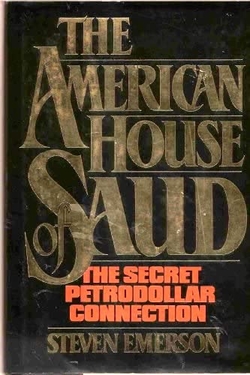 After the price of oil quadrupled in 1973, Syria and other Arab states put pressure on Saudi Arabia to use its new wealth against Israel. Part of the Saudi government's response was to lead a campaign against support for Israel in the U.S.
After the price of oil quadrupled in 1973, Syria and other Arab states put pressure on Saudi Arabia to use its new wealth against Israel. Part of the Saudi government's response was to lead a campaign against support for Israel in the U.S.
On their own, however, the Saudis lacked the connections and savvy to affect American-Israeli ties. To make up for this, the Saudi state recruited help. In The American House of Saud (Franklin Watts, 448 pages, $18.95), Steven Emerson, a journalist and former staff member of the Senate Foreign Relations Committee, chronicles anti-Israeli activities undertaken in recent years by prominent Americans who were receiving or prepared to receive Saudi money.
What perturbs Mr. Emerson is not pro-Saudi bias as such; his opinions on the Arab-Israeli conflict are kept out of The American House of Saud. Nor does he seem to have a quarrel with Arab-Americans (nor their Jewish counterparts) who lobby for their beliefs. Rather, he attacks the arrangement by which paid agents surreptitiously forward the goals of a foreign government while ostensibly trying to promote American interests.
To test this book's reliability, I sent letters to seven of the people accused by Mr. Emerson of mischief. In only one case - a State Department official who wrote a book on Saudi Arabia - did I receive an even partly convincing denial.
Among the leading lights named in this expose is J. William Fulbright, who wrote an article about the Camp David Summit in 1978 in which he advocated a position very similar to that of the Saudi government. The article was published in Newsweek, where Mr. Fulbright identified himself only as a "former U.S. Senator [who] practices law in Washington, D.C." Actually, he was at the time a registered agent of the Saudi government, and he listed his Newsweek article with the Justice Department as one of his activities undertaken on the Saudis' behalf. When I asked him to address Mr. Emerson's accusation of impropriety, Mr. Fulbright gave only the evasive answer that his article "had no reference whatsoever to legal representation of Saudi Arabia" by his law firm.
A number of former ambassadors to the Arab countries are on the Saudi payroll. Mr. Emerson documents that one of them, Andrew I. Killgore, said in public that his company did not do public relations work for Saudi Arabia when in fact it did. Offered a chance to respond, Mr. Killgore did not deny the charge. Instead he accused me of wishing to "silence" him.
A second former ambassador, John C. West, rushed to Miami in April 1982. His task? To keep Saudi Prince Turki, accused of fighting with the police, out of jail. How? By winning retroactive diplomatic immunity for him. Mr. West's motive? According to Mr. Emerson, since 1981 Mr. West had been retained by a Saudi firm for $10,000 a month. Responding to this information, Mr. West wrote that he does not represent the Saudi government -leaving open the possibility that he might represent private Saudi interests.
Mr. Emerson also notes that the West Foundation, set up by Mr. West, had previously received $500,000 from "a Saudi citizen" and that Prince Turki later donated an undisclosed amount. Asked to comment, Mr. West would not name the contributors to the West Foundation.
James E. Akins, a third former ambassador, adopts such a tough pro-Arab stance that he often appears "more pro-Arab than the Arab officials," says Mr. Emerson. For example, in 1981 Mr. Akins rebuked Sheik Zaki Yamani, the Saudi oil minister, for disavowing links between Saudi oil production and U.S. policy in the Middle East. Mr. Emerson implies that Mr. Akins was "attempting to reinforce the Arabs' blackmail of the United States" as a means of winning more petrodollar business for himself. Mr. Akins did not respond to my repeated efforts to hear his side of the story.
Other major figures tagged by Mr. Emerson as having joined the chase for Saudi money include Spiro Agnew, Bert Lance and Jimmy Carter. Mr. Emerson argues that Mr. Agnew - previously well disposed toward Israel - began fulminating against "Zionist influences in the United States" as part of his successful effort to attract Saudi business. He shows that Bert Lance received a $3.5 million loan from a Saudi financier, which he did not sign for. Subsequently, Mr. Lance spoke of "the great Jewish ownership of the press." And Mr. Emerson juxtaposes Jimmy Carter's effusive praise of the Saudi government in 1983 with the willingness of a Saudi financier to pick up the $50,000 tab for a Carter Presidential Library benefit.
There are other disturbing conjunctions. Mr. Emerson alleges that top officials of Reader's Digest met with representatives of the Organization of Petroleum Exporting Countries in January 1975 and offered to run some favorable articles about OPEC for a fee of up to $4,530,000. Reader's Digest says that it meant only to sell advertising to OPEC. But the book notes that a European editor with no responsibility for advertising attended the meeting.
Mr. Emerson implies that the blame for the duplicity he describes falls more on the Americans who do the dirty work than on the Saudis who employ them. That's a tough call. What is clear is that Mr. Emerson has uncovered a grand deception.
Mr. Pipes is an associate professor at the U.S. Naval War College. The views expressed here are his own.